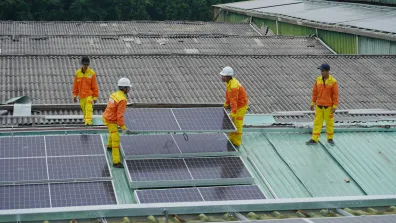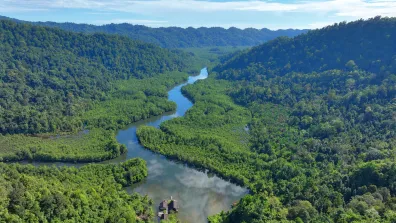Why we must move beyond extraction

The relentless burning of fossil fuels is driving the climate crisis: escalating global temperatures and leading to climate breakdown — more frequent and extreme floods, droughts, hurricanes and heatwaves — that are threatening the lives and livelihoods of millions.
And now, as corporations are pushed to confront their devastating addiction to fossil fuels and transition to ‘green’ energy, they are driving a new wave of community displacement and dispossession across the Global South. Ecosystems across Africa and Latin America are being plundered for the so-called ‘critical’ minerals needed for the transition to renewable energy — from electric batteries to wind turbines.
The logic behind this? Exactly the same thinking that got us into the climate crisis — infinite extraction and consumption on a planet with finite resources. An approach designed to maximise profit for the few, not improve the lives of the many.
The fossil fuel companies, multinational corporations and Global North governments pushing for this continued extraction of the Earth’s natural resources as a climate-crisis ‘solution’ are those profiting. Conversations are narrowed to focus solely on reducing carbon emissions, or decarbonisation — to allow business as usual without impacting corporate profits. But the damage and destruction the climate crisis is wrecking on people and planet cannot be quantified in carbon emissions alone — this is not a solution. Equally important are issues such as biodiversity loss, ecosystem destruction and equality of resource use — all of which would mean questioning corporate profit based on the logic of unchecked and limitless extraction.
Extractivism
For centuries, land and life — humans, animals and the environment, whole ecosystems — have been treated as resources to be extracted, exploited and consumed for profit, for the benefit of a tiny minority.
When everything is judged solely by its potential to create profit, the abundance of life, communal value, and cultural significance of land and place are disregarded, and our connection to the land around us is severed. Under this extractivist ‘logic’, rainforests must be felled to make way for more lucrative, but less life-sustaining timber production. Rivers teeming with aquatic life and providing drinking water must be diverted to service the hugely water-intensive industrial mining processes that extract precious metals like lithium from salt flats. And Indigenous peoples who have farmed in harmony with the surrounding environment for generations must be driven off their lands, to make way for industrial farms that poison the ground with pesticides to maximise yields, to make as much profit as possible for agricultural corporations and commodity traders.
This extractivist approach underpinned the injustices of colonialism — designating communities, peoples and lands of the Global South as sacrificial sites for extraction to fuel Global North ‘development’. And it is this extractivist approach which has led us into the climate crisis.
The UK and other wealthy Global North countries are now beginning to accept the inevitability of a transition away from fossil fuels to solar, wind and water. As the focus switches to ‘green’ technology, millions of tonnes of resources are being extracted from the Earth — such as cobalt (used in magnets for wind turbines), lithium (used in electric batteries), and balsa wood (used in wind turbine blades). The environmental and human cost of this extraction is huge.
Mining and industrial forestry (environmentally-damaging practices of large-scale commercial tree planting to produce timber as quickly as possible) are rapidly expanding, destroying entire ecosystems, devastating biodiversity, polluting water and soil, and driving the dispossession and displacement of millions of people.

Breaking free
Global South communities on the frontlines of colonialism — and now the climate crisis — continue to struggle for justice, and resist extractivism, which sees their lives as expendable; from Nigerian social movements taking Shell to court for environmental damages, to Fijian activists fighting against climate disruption by reforesting mangroves to prevent soil erosion, to Indigenous Brazilian communities defending biodiverse rainforests from corporate encroachment.
Not only are communities from Colombia to the Congo resisting extractivism, their livelihoods and worldviews offer alternative visions. In Latin America, the Quechua people’s philosophy of sumak kawsay (‘good living’), centres around community, ecological balance and cultural sensitivity. Similarly, widespread across African communities is the practice of Ubuntu (‘I am because you are’), which emphasises the interconnectivity of living things. In India, the philosophy of Swaraj ('self-rule'), calls for the relocation of power to within communities, and in Europe concepts of ‘the commons’ are based on communal value, where the cultural and natural resources are accessible to all members of a society. All these worldviews, philosophies and pathways present urgent alternatives to our relationship with the planet and each other.
In May 2023, War on Want hosted a delegation of grassroots movements, organisers, activists, campaigners, community leaders and academics from across these cultures and worldviews, who have issued an urgent call for a just and democratic transition where the essential needs and wellbeing of all living creatures are respected. Their call, The Manifesto for an Ecosocial Energy Transition from the Peoples of the South, invites us to confront the fear of change, and embrace universal understandings of wellbeing and ways of knowing. It invites us to go beyond carbon-counting and recognise the value of the intangible: life, joy and connection, time with family and loved ones, public abundance and the commons, liberation and justice.
This rebalancing of what is important, of what holds value for people and the planet, demands that we go further than decarbonisation in the transition to a fairer, more just future. False climate ‘solutions’ must be rejected — such as ‘offsetting’ carbon released into the atmosphere, rather than keeping fossil fuels in the ground. Green colonialism must be rejected — whereby richer, Global North countries benefit from exploiting poorer Global South countries’ resources, under the pretext of environmental benefit. Climate reparations must be paid for ecological damages, human rights defenders protected, energy poverty eliminated, and international trade agreements that squeeze wealth from the Global South denounced.
The Manifesto for an Ecosocial Energy Transition delegation's public event in London.
Post-Extractive futures*
‘Post-extractivist' visions for the future present alternatives to continued extraction in the name of ‘development’ — visions based on valuing our deep connection to the Earth and the life it nurtures and learning from the wisdom of Indigenous peoples — who have long understood the importance of living in harmony with the land. Integrating these values and wisdom into our pursuit of a thriving planet for all is essential.
A post-extractive approach understands that resources are finite and hold value beyond their monetary worth, and that the process of extraction has costs far beyond the financial. Resource-use must be based on what is fair and just for all and prioritise raising living standards for the majority of people within planetary limits, rather than maximising profit for a few at any cost.
For example, rather than replacing petrol or diesel cars with electric cars, the focus for governments should be on ensuring high-quality, affordable and energy-efficient public transport. This would increase mobility for everyone, especially the poor and people living with disabilities. It would enable greenspaces to be reclaimed and improve air quality in cities and towns previously dominated by cars, roads and parking lots. At the same time, it would reduce resource-use and alleviate the burden on our planet. With less demand for resources, mining could be scaled back, and reoriented to respect the needs and rights of local communities. Similarly, retrofitting homes with insulation would increase energy efficiency — and help slow global heating — whilst reducing heating bills.
Governments must promote energy efficiency and facilitate transformations across societies towards fair and sustainable resource-consumption, to alleviate pressure on the Earth's ecosystems — all whilst increasing quality of life for everyone. War on Want’s call for a Global Green New Deal embraces a post-extractive vision of the future where our societies, economies, and ecosystems thrive in harmony.
*Post-Extractive Futures first came into being during a meeting in 2022, hosted by War on Want, Tipping Point UK, and Junte Gente (Puerto Rico). This gathering fostered collaboration between movements fighting for and creating futures beyond extractivism, uniting those working in environmental and climate justice, just transitions, post-growth and degrowth, decolonisation and abolition, and eco-feminism.


